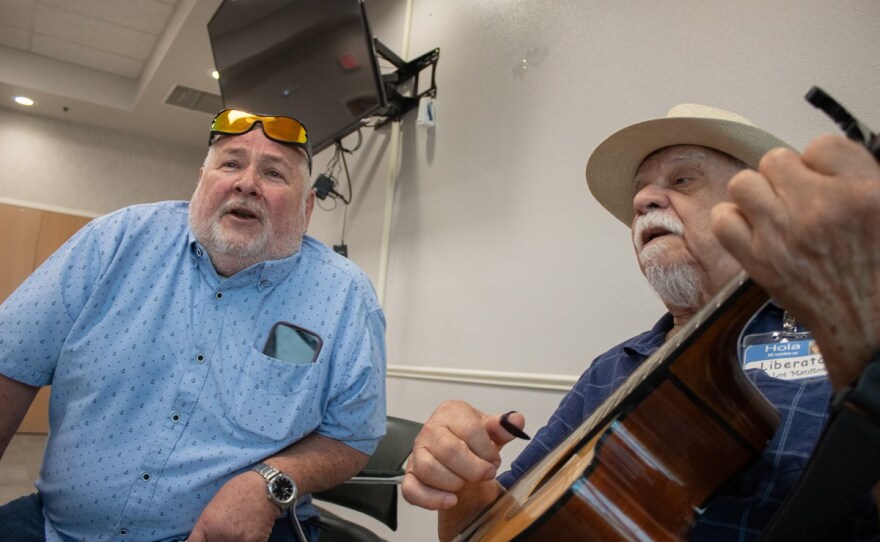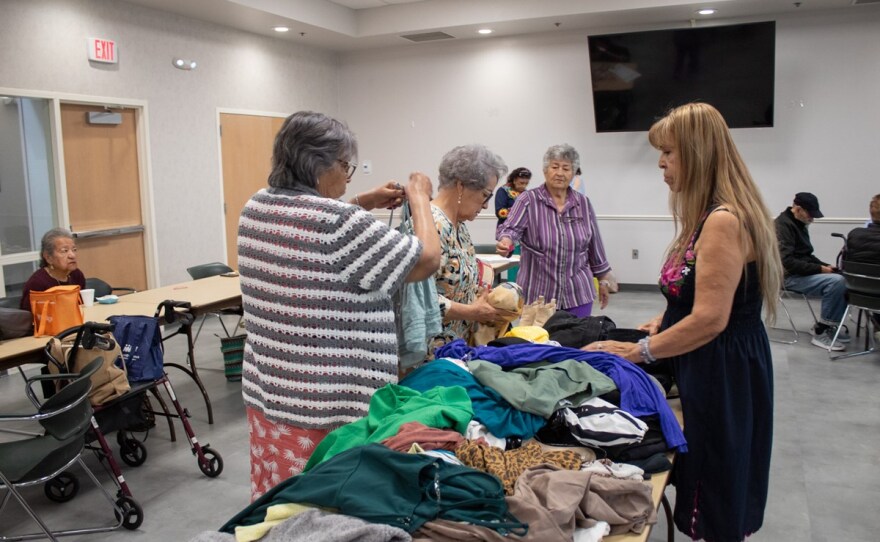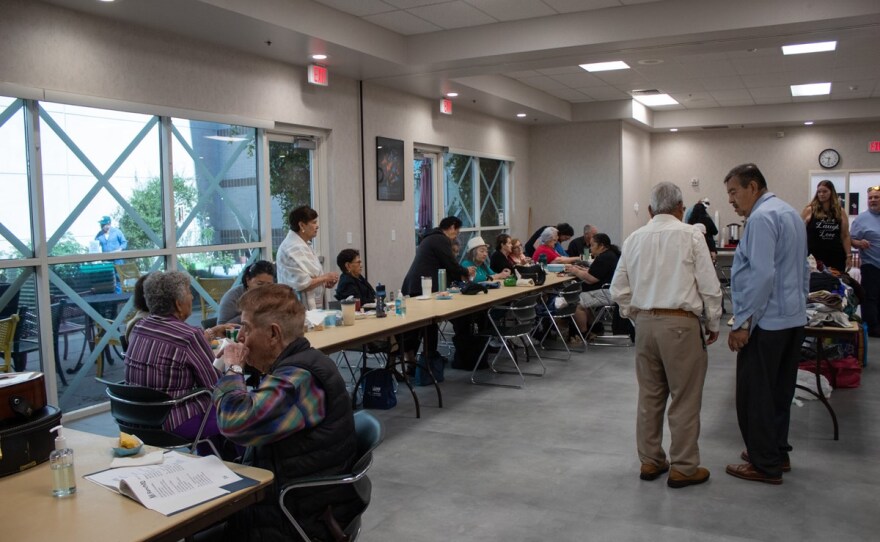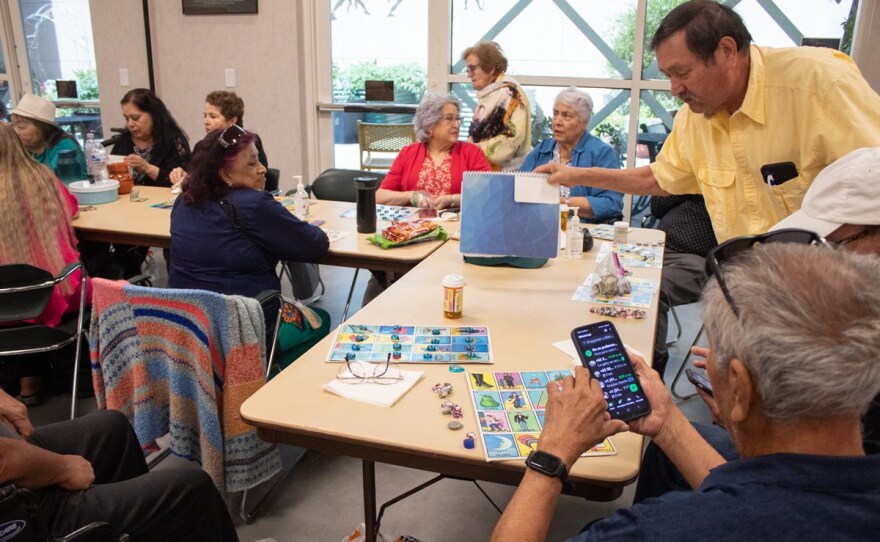The rhythmic plucking of guitar strings carrying familiar melodies of old Mexican classics and bellowing singers filled the air with nostalgia. Around them, people laughed and exchanged gently worn clothing — a morning ritual signaling the start of the group’s weekly meet-up.
This is Manitos — a weekly gathering of older Latinos comprised of two groups, one of which meets at the Sam & Bonnie Pannell Community Center in Sacramento’s Meadowview neighborhood. At the heart of this group is Liberato Correa Ramos, the group’s 85-year-old resident musician with a deep baritone voice and infectious charm.
To him, Manitos is more than just a weekly meeting. It’s like a job he says he’s happy to do every week.
“Here I am with my friends, the ones who sing with me and eat with me,” he said in Spanish. “Yes, this is like my family — they’re my brothers, my sisters. I’m old and can’t do much anymore, but I can sing.”
The group has helped with his mental health too.
“It helps us stay alive and stay happy and motivated to keep living to 100 years or more,” he said.

Arturo Anaya Gonzalez, 68, sings with Ramos. He remembers when he first joined the group, he would quietly sit while others danced because of his bad knees. But one day, a now 103-year-old woman invited him to dance.
He hesitated to say yes because he was afraid he’d fall and hurt her.
“So she brought over two other ladies — 97 and 98 years old — and the three of them lifted me up,” he recounted in Spanish, still amazed. “ And there they were, dancing and dancing with me.”
Gonzalez said that moment changed him.
“Now, I walk, I dance, I sing with them. I came back to life,” he said. “That’s what we need.”
This community exists thanks to Maria Lueras, who in 1998 decided the Latino senior community needed not only a place to find vital resources, but also a place to create friendships, reclaim joy and celebrate growing old together.
How it started

Lueras used to work at the senior center where she designed programs and connected seniors to services.
She started collecting the names of Spanish-speakers who attended the programs, realizing they were lonely and isolated. Many of them also did not utilize the services available to them because they didn’t know about them.
That realization sparked the idea for Manitos.
“One of the goals in creating Manitos was to bring those services to the gatherings so that they could partake in some of the benefits that they were entitled to that they didn’t know about,” she explained.
The name came naturally to Lueras.
“It’s a commonly used term in the Southwest, especially New Mexico, where my roots are,” she said.
It comes from the Spanish words “hermanito” and “hermanita” — little brother and little sister.
Over the years, the group has become bigger than she could have imagined, with marriages and friendships that have lasted since the beginning.
But her inspiration for the group runs deeper. According to her, it stems from her mother, who was raised on a farm and never had a formal education. Lueras said her mother taught herself English, but it was always broken.
She and her 10 siblings would speak English in front of their mother without considering her enough to include her in the conversation.
“It’s like being deaf,” she said. “I’m going a little deaf so I can relate. But at that time, she was left out and later on, as I [began] working with these people, I started thinking about her and how she was like them.”
Today, Lueras sees Manitos as a welcoming space to anyone seeking joy and connection, whether they speak Spanish or not.
“I have my lonely days where I need a boost,” she added. “I didn’t create it for myself but I’m certainly getting a lot of joy and it’s been a great advantage to me.”
Still, one concern remains for the group’s members: preserving their stories. That’s where artist and documentarian Janine Mapurunga stepped in. She’s leading a project to help members record and share their histories before they’re lost.

Bien Juntitos
The Bien Juntitos project began in 2023 with the goal of sharing Manitos members’ stories, including the sacrifices many of them made to get to this country, that would otherwise die with them.
Mapurunga noted that many members are first-generation immigrants with grandchildren who don’t speak Spanish.
“They wanted their stories to be recorded so that their stories could be their legacy, so they could survive them, so they could be shared with their kids, with their grandkids and with other people,” she said.
Being raised by her grandma and great-grandma in Brazil, Mapurunga said she has a soft spot and deep respect for elders. That’s why she agreed when Manitos members asked her to work on a book filled with their life stories.
“They can touch it in their hands, they can read the stories. They’re used to that format” she said.
But as a documentary photographer, she also wanted to create a film she believes will “reach a broader audience.”
She received a grant to fund the project, but that has since run out. She’s volunteering her time to finish the project but still needs funding to finish editing the film and publishing the book.
For Mapurunga, the project is a way to give group members “the spotlight” and to “resist the erasure” of their histories, many of which are traumatic. She’s conducted more than 50 interviews for the project, which she said were emotionally intense.
“They have spilled so many details about the horrifying things that they had to endure,” she said. “Many of them told me that their interview for this project felt like the first time they had a therapy session. They said that no one’s ever asked about their lives. So many of them cried.”
Among those who shared their stories is Marcelino Iñiguez — a poet, immigrant and longtime member known for having the right poem for any occasion.
The poet

Iñiguez is known within the group as “el poeta” — the poet. He took on poetry when he joined the group nearly a decade ago and has since written dozens of poems, published one collection and is working on a second.
Originally from Mexico, he crossed the border in the 1970s in search of a better life for his family. The 77-year-old is now a U.S. citizen and has been in Sacramento since 1973.
“I used to dream as a child in school of one day seeing Sacramento,” he said in Spanish. “But it felt impossible to me. How? When would I ever go? It was just too far. And little by little, with time, that dream came true.”
Many of his poems reflect on the connections he’s formed through Manitos. He often reads a birthday poem to anyone celebrating and wrote “Grupo Manitos,” which touches on the solidarity and friendships he’s found in the group.
Translation of “Grupo Manitos” (Manitos group)
This is the Manitos group, which by fate’s design,
we’ve come together to have a great time,
living like friends in our weekly gathering.
We all come happy and ready for fun.
I can’t wait for the gathering to begin,
so I can greet the friends I’ve found here.
Friends you won’t find just anywhere — not in any plaza or tavern —
they’re true friends who give advice, who listen,
and who are always ready to help without hesitation.
Fly, fly, little dove, don’t get tired of flying.
Go and tell the Manitos group
they’re not so alone anymore —
now they have someone to talk to.
But Iñiguez’s poetry addresses more than just joy. It also documents the hardships he’s had to endure to get to where he is today. In “Sueño Americano,” he reflects on what he called in Spanish “the illusion of the American dream.”
Translation of “Sueño Americano” (American Dream)
And so what was feared came to pass —
everything people were afraid of became real.
Thousands, sad and full of anguish,
because they’re going to be deported.
So many sacrifices made in vain
by all those families who risked even their lives
just to finally cross the border
and reach American soil.
All of that was undone
by the hatred and anger of that man
who ruined the dream with his thirst for power
and his hatred of immigrants.
So many American dreams faded away,
were cut short,
and never came true.
His poems — some already published — help ensure that his stories and the story of Manitos group will live on. If nothing else, they will be remembered one poem at a time.






